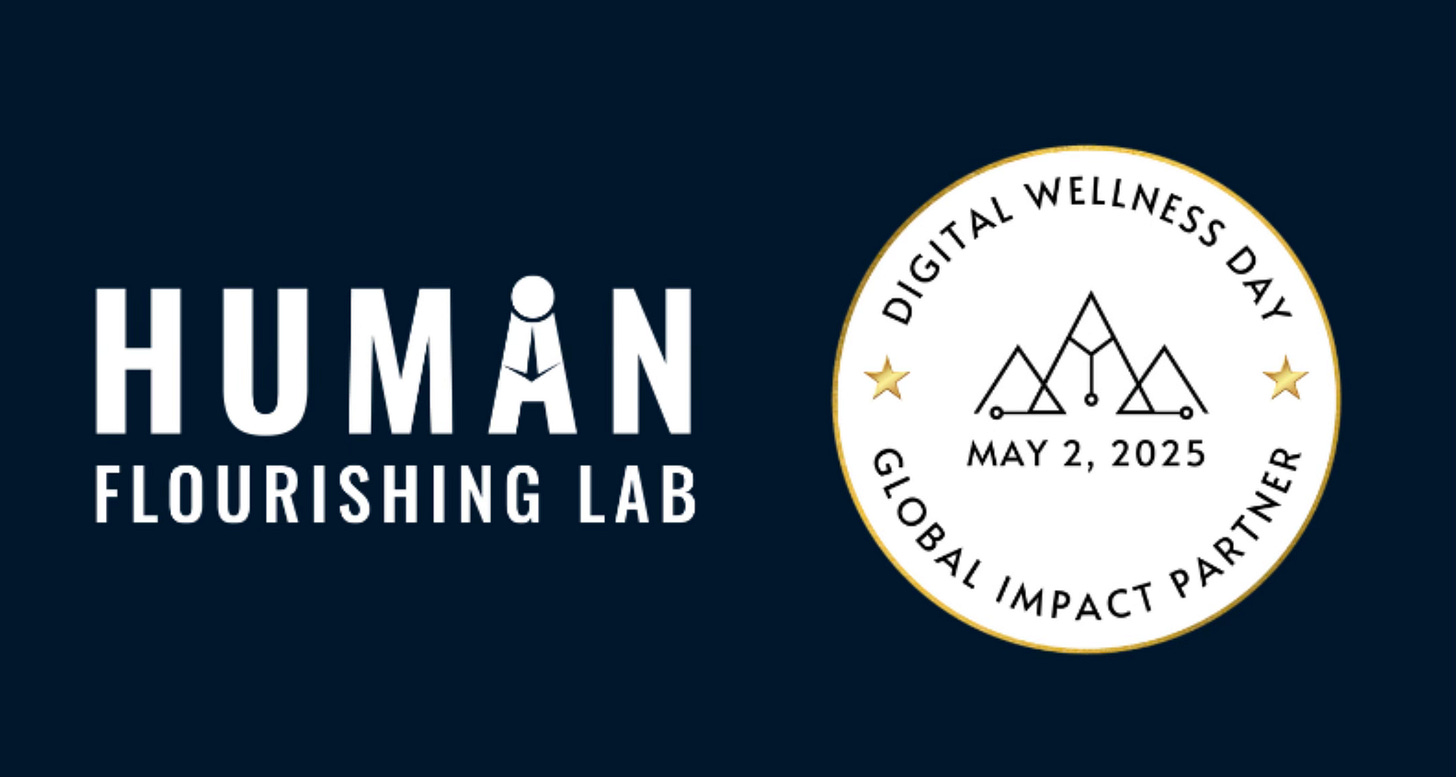Finding the Good in Our Digital Lives
Today, May 2nd, marks Digital Wellness Day, a global initiative empowering people worldwide to harness technology in ways that enrich their lives. Our team at the Human Flourishing Lab is proud to serve as a Global Partner in this movement, which provides free, research-based resources supporting "the optimum state of health and well-being that each individual using technology is capable of achieving."
The goal of enhancing digital wellness aligns with our lab's mission to understand and promote human flourishing across all dimensions of life. At the lab, we emphasize the importance of individual agency and freedom. Thus, when it comes to digital wellness, we aim to help people strengthen their capacity to self-regulate their technology use in ways that maximize benefits while minimizing harms.
Our public discourse about technology, particularly social media and smartphones, has become fixated on the dark sides of our digital lives. Headlines warn of addiction, mental health crises, misinformation, and social fragmentation. But what if we're missing a big part of the story? What if, by focusing almost exclusively on technology's potential harms, we're failing to identify ways in which people are benefiting from digital engagement and neglecting vital lessons from those who are thriving in digital spaces?
With these questions in mind, our team partnered with Dr. Sophie Janicke-Bowles, a professor at Chapman University who studies digital wellness, to conduct a national survey examining digital flourishing among American adults. I've shared this survey in a previous newsletter but since it is Digital Wellness Day, I wanted to revisit this research.
So what exactly is digital flourishing? In our research, we conceptualize digital flourishing as feeling good about how we interact with others online and the choices we make in our digital lives. This includes five dimensions of user perceptions: how comfortable people feel presenting their true self online (authentic self-disclosure), how connected they feel to online communities (community connectedness), how well they feel they can self-regulate their time spent online (self-control), how capable they feel at engaging in civil discourse online (civil participation), and how motivated they are to pursue their goals when comparing themselves to others online (positive social comparison).
Scholarly studies by Dr. Janicke-Bowles and other researchers have demonstrated benefits of digital flourishing for psychological and social health. However, those studies did not document the extent to which the general American public is digitally flourishing. Therefore, we conducted a nationally representative survey of just over 2,000 American adults about their current state of digital flourishing and how it relates to their overall mental and social health.
What we found paints a more hopeful picture than is commonly presented. Most American adults report flourishing in their digital lives. Americans generally feel comfortable presenting their authentic selves online, believe they can engage in civil discourse, feel in control over their online time, and feel connected to online communities. The only dimension where less than a majority of Americans flourish is in positive social comparison, though this varies significantly by age groups, with majorities of younger generations (Gen Z and Millennials) reporting that they are flourishing on this dimension.
In addition, we discovered a consistent positive association between digital flourishing and both mental and social health. This suggests that many people are finding ways to engage with digital technology that support rather than undermine their wellbeing. These findings were consistent across generations but are perhaps particularly relevant for Gen Z, who report higher levels of mental health challenges and loneliness compared to other generations. Given that Gen Z spends significant time in online environments, fostering digital flourishing among this cohort may be especially valuable for supporting their overall flourishing.
Americans aren't going to stop using digital technologies. By many indicators, we clearly value the innovations that have made our lives easier, given us greater access to information, connected us with loved ones, provided platforms for creativity and expression, and opened doors to new communities and opportunities. While our research shows that most Americans are digitally flourishing, we must not forget those who struggle. How can we help everyone develop the skills and practices that make digital engagement more fulfilling? There is certainly room for improvement.
We should focus on helping people strengthen their self-regulation skills. We should work to cultivate digital environments that foster authentic connection and thoughtful discourse. We should aim to constructively engage with and uplift others online, not attack or tear them down. And we should encourage the kinds of positive social comparisons that inspire personal growth and motivate people to reach their full potential.
On this Digital Wellness Day, I invite you to consider not just how to minimize technology's harms, but how to maximize its potential to support human flourishing. Let's create a future where technology serves as a powerful tool for enhancing wellbeing, enabling meaningful engagement with both our digital and physical worlds.
Have a great weekend!
Clay

